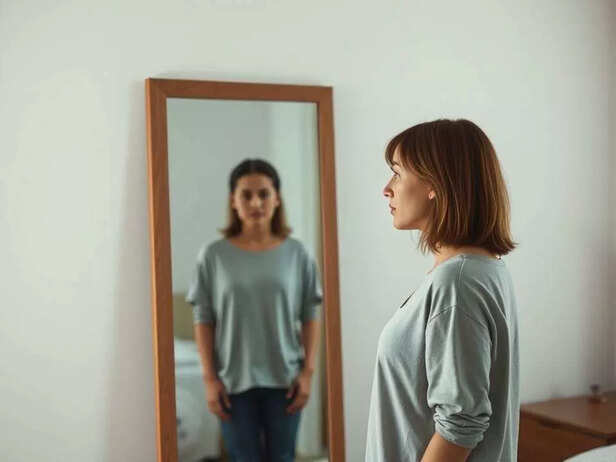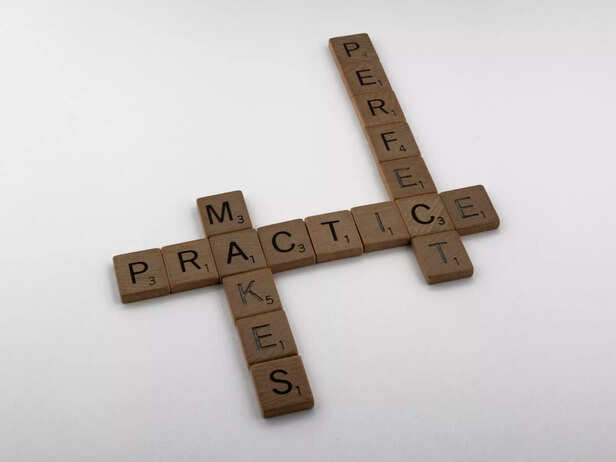Why We Chase the Perfect Body And Still Feel Empty Inside
Kaushal | Sep 02, 2025, 17:01 IST
( Image credit : Timeslife )
The pursuit of an ideal body image often results in dissatisfaction. Social media promotes unrealistic standards. This creates a cycle of comparison and validation-seeking. Fitness can become an obsession, leading to mental stress. True fulfillment comes from inner peace. Focus on health, not perfection. Redefine fitness and celebrate non-physical achievements. Prioritize mental and emotional well-being for lasting happiness.
We’ve all been there standing in front of a mirror, adjusting, flexing, sucking in the stomach, hoping to see the “perfect body” we’ve been chasing. Social media floods us with six-pack abs, flawless skin, and sculpted curves. But here’s the paradox: even when some people finally reach that goal, they often confess they still feel empty in backside. Why does this happen? Why does chasing the perfect body sometimes lead to insecurity instead of happiness? Let’s dive deeper.

The idea of a “perfect body” has never been stable. In the 90s, thinness was ideal. In the 2010s, curves took the spotlight. Today, fitness culture glorifies abs, muscle tone, and “clean eating.”

So why do we keep running after this illusion? Psychologists say it comes down to three things:
1. Validation: We crave approval likes, compliments, admiration.
2. Control: In a chaotic world, controlling our body feels like controlling life.
3. Comparison: Scrolling through Instagram feeds makes us believe “everyone else” is fitter, prettier, or happier.
Research from the Journal of Health Psychology shows that even people who reach their fitness goals often report dissatisfaction because the root issue isn’t physical, it’s emotional.

Exercise and healthy eating are good until they cross into obsession.

1. Redefine Fitness: Instead of aiming for perfect, aim for healthy, strong, and happy. Walk because it clears your mind. Eat for nourishment, not punishment. Rest without guilt.
2. Unfollow the Illusion: Social media is a highlight reel, not real life. Unfollow accounts that trigger comparison. Follow creators who promote body positivity, balance, and real struggles.
3. Work on Inner Fitness: Healing starts within therapy or journaling to uncover why validation feels so addictive. Mindfulness practices like yoga or meditation to connect with your body in a kind way. Self talk check replace “I’m not enough” with “I’m growing, I’m learning.”
4. Celebrate Non Physical Wins: Ask yourself What makes me feel alive outside of looks? Helping a friend. Creating art or music. Learning a new skill. Spending time with family. These give deeper fulfillment than a number on a scale.

Emma’s Story: After years of dieting, she hit her “goal weight” yet felt lonelier than ever. Only when she focused on friendships and passions did she feel truly alive.
Raj’s Story: A gym enthusiast who finally got abs realized the applause faded quickly. What lasted was his joy in teaching others and building community in his fitness group.
These stories show that wholeness comes from within, not just from the outside.

Perfection is not real. Health is not about appearance. And self worth has nothing to do with size, shape, or muscle definition. The perfect body is an illusion sold to us through filters, ads, and fitness ads. But the real prize is peace the kind that comes when you know you’re enough exactly as you are.
Chasing the perfect body may give a temporary high, but it rarely fills the emptiness inside. What truly lasts is balance caring for your body while also nurturing your mind, heart, and soul. So next time you stand in front of the mirror, ask yourself: Am I chasing perfection, or am I chasing peace? One will keep you running forever. The other will finally let you rest.
The Perfect Body: A Moving Goalpost

Self acceptance
( Image credit : Times Life Bureau )
The idea of a “perfect body” has never been stable. In the 90s, thinness was ideal. In the 2010s, curves took the spotlight. Today, fitness culture glorifies abs, muscle tone, and “clean eating.”
- For men: Broad shoulders, defined abs, V-shape.
- For women: Slim waist, glowing skin, toned legs, and the infamous “hourglass” figure.
But the goalpost keeps shifting. What’s praised today may be outdated tomorrow. That’s why perfection is never truly achieved it’s always something more, something different.
The Psychology Behind the Chase

Psychology on Body
( Image credit : Unsplash )
So why do we keep running after this illusion? Psychologists say it comes down to three things:
1. Validation: We crave approval likes, compliments, admiration.
2. Control: In a chaotic world, controlling our body feels like controlling life.
3. Comparison: Scrolling through Instagram feeds makes us believe “everyone else” is fitter, prettier, or happier.
Research from the Journal of Health Psychology shows that even people who reach their fitness goals often report dissatisfaction because the root issue isn’t physical, it’s emotional.
The Fitness Trap: When Health Becomes Obsession

Obsession
( Image credit : Unsplash )
Exercise and healthy eating are good until they cross into obsession.
- Endless workouts: 2 hours at the gym daily.
- Strict diets: Cutting out entire food groups..
- Guilt cycles: Feeling “bad” after eating a slice of cake.
Breaking the Cycle: From Chasing to Healing

Chase to heal yourself
( Image credit : Unsplash )
1. Redefine Fitness: Instead of aiming for perfect, aim for healthy, strong, and happy. Walk because it clears your mind. Eat for nourishment, not punishment. Rest without guilt.
2. Unfollow the Illusion: Social media is a highlight reel, not real life. Unfollow accounts that trigger comparison. Follow creators who promote body positivity, balance, and real struggles.
3. Work on Inner Fitness: Healing starts within therapy or journaling to uncover why validation feels so addictive. Mindfulness practices like yoga or meditation to connect with your body in a kind way. Self talk check replace “I’m not enough” with “I’m growing, I’m learning.”
4. Celebrate Non Physical Wins: Ask yourself What makes me feel alive outside of looks? Helping a friend. Creating art or music. Learning a new skill. Spending time with family. These give deeper fulfillment than a number on a scale.
Real Stories: Beyond the Perfect Body

Practice makes perfect
( Image credit : Unsplash )
Emma’s Story: After years of dieting, she hit her “goal weight” yet felt lonelier than ever. Only when she focused on friendships and passions did she feel truly alive.
Raj’s Story: A gym enthusiast who finally got abs realized the applause faded quickly. What lasted was his joy in teaching others and building community in his fitness group.
These stories show that wholeness comes from within, not just from the outside.
The Truth We Forget

Gym
( Image credit : Timeslife )
Perfection is not real. Health is not about appearance. And self worth has nothing to do with size, shape, or muscle definition. The perfect body is an illusion sold to us through filters, ads, and fitness ads. But the real prize is peace the kind that comes when you know you’re enough exactly as you are.
Conclusion: Choose Fulfillment, Not Just Fitness
Frequently Asked Questions [FAQs]
- Can social media really affect how I feel about my body?
Yes, social media can shape body image by constantly showing “perfect” looks. These highlight reels often make people compare themselves unfairly. Limiting screen time, unfollowing negative accounts, and curating a healthier feed can reduce pressure. Remember: most images online are filtered, edited, or staged not reality. - How do I know if I’m obsessing too much about fitness?
If workouts feel like punishment, rest days create guilt, or your mood depends on body changes, it may be obsession. Fitness should improve your life, not control it. Ask yourself: “Am I exercising for health and joy, or only chasing looks?” Balance is the key. - What role does culture play in our body expectations?
Culture heavily influences beauty standards. In some eras, fuller bodies meant wealth; today, slim or muscular looks dominate. These ideals shift with time and place. Recognizing cultural pressure helps you detach from unrealistic standards and focus on health, confidence, and authenticity, rather than chasing a trend. - How can I build confidence if I don’t love my body yet?
Confidence doesn’t require loving every part of your body. Start by appreciating what it allows you to do walk, laugh, hug, create. Shift focus from looks to abilities. Surround yourself with uplifting people. Over time, gratitude builds self respect, which is the foundation of lasting confidence. - Is therapy useful for body image struggles?
Yes, therapy can be very effective. Many people carry hidden beliefs about worth and appearance from childhood or past experiences. A therapist helps unpack these layers, develop healthier coping skills, and build self-acceptance. Professional support often makes the healing journey faster and more sustainable than going alone.
